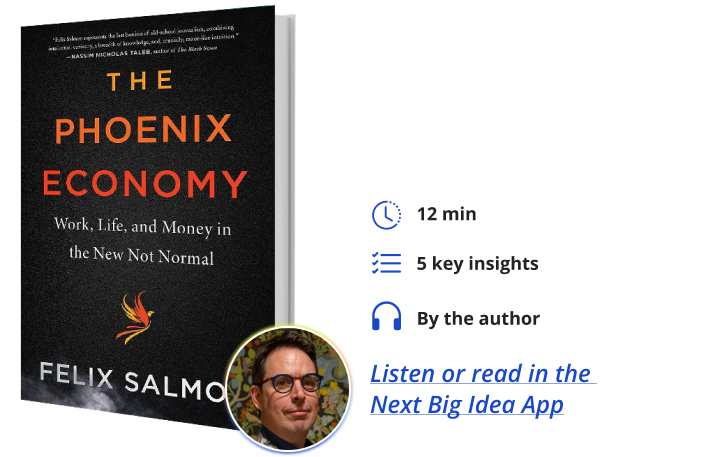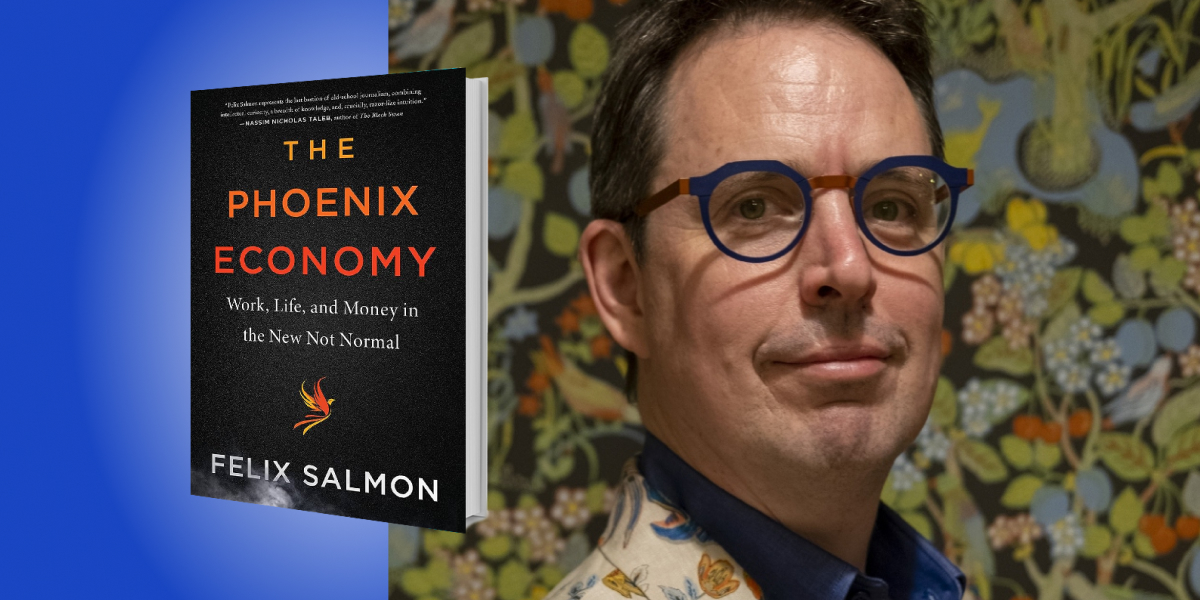Felix Salmon is the chief financial correspondent at Axios and the host of the weekly Slate Money podcast. He earned an MA in philosophy and art history from the University of Glasgow. He has worked for noted economist Nouriel Roubini and his work has been published in Reuters and Condé Nast. He has won major business journalism prizes, including the American Statistical Association’s Excellence in Statistical Reporting Award.
Below, Felix shares five key insights from his new book, The Phoenix Economy: Work, Life, and Money in the New Not Normal. Listen to the audio version—read by Felix himself—in the Next Big Idea App.

1. The new not normal.
You might think that everything is weirder and more unexpected than it used to be, and you are right. It turns out that with hindsight, there was this very unusual period of calm for about 70 years, from roughly 1945 to 2015. Then 2016 happened, with the election of Trump and the Brexit vote in the UK, there was a rise of unpredictable politicians and movements around the world. After that, COVID hit in 2020. At this point, all of the big post-war structures that were keeping volatility down and making things more predictable had pretty much evaporated. We are now back to what you could think of as “normal” in the 19th century, the 18th century, or even the 17th century. Life was much less predictable in those days.
For most of the 20th century, we lived in a world where someone like Warren Buffett could come along with one big idea and say, “I’m going to make a big bet on America being great, and that one big bet will always be true, and it’s going to make me the richest man in the world.” That is not a world we live in anymore. The world we live in is much more unpredictable, it has much fatter tails, much higher upsides, and lower downsides. We need to be nimbler to navigate it. We can’t just believe one thing that is always going to be true. We’re going to have to update our beliefs, and we’re going to have to get used to a level of volatility, both in terms of climate change, in terms of infectious diseases, and in terms of the economy. That is going to be pretty disconcerting.
2. YOLO: You only live once.
COVID, in particular, has given us an incredibly renewed appreciation of the value of life. We realize now much more than we did before 2020 that you only live once and that we have one precious life to live. We certainly don’t want to spend the best years of our lives, the healthiest years of our lives, working in some dead-end job for some boss that we hate. We want to go out there and make the most of this one life that we’ve been given. We also appreciate that in others. We appreciate the way that other people are quitting their jobs and following their dreams in a way that would’ve felt a little bit weird pre-pandemic. That’s ultimately positive.
“The pandemic was altogether a tragedy, but those who have come out the other side of it have got a new lease on life.”
If you look at how happy people are in their jobs, they are happier now. In fact, they’re just happier in general than they ever were pre-pandemic. A lot of people, of course, aren’t here to be happy because they died in the pandemic. Over a million Americans died of COVID and many live with long COVID. The pandemic was altogether a tragedy, but those who have come out the other side of it have got a new lease on life. We now have a new excitement about where we can go in life. It’s incredibly positive on a personal level as well as on an economic level because those kinds of dreams and desires are ultimately the kind of things that drive any country and any economy forward.
3. The epistemic crisis.
During COVID there was a major epidemiological crisis, but one of the things that happened is that we found ourselves in a world without certainty. We found ourselves in a world where we had really important and very urgent questions. What is this disease? How does it work? At the time, there were no answers. Up until that point, we were in a world where we had a supercomputer in our pockets, and we could just pull it out and find anything we needed to know. The world, to a large degree, was solved. We knew how to be efficient. We knew what the answers were to the questions that we wanted to ask.
Suddenly though, we were in this new world where Anthony Fauci would come out and say something different today from what he said yesterday. There was a real feeling that we were being lied to. Of course, it wasn’t because he lied. It was simply because he didn’t have as much information yesterday as he had today. We were confronted with the feeling of looking into the an uncertain future. This uncertainty was also there while looking into the present. For instance, a lot of people were absolutely convinced over the past couple of years that we were in a recession, and we weren’t. We don’t even know where we are right now, let alone where we’re going to be in the future. That fact of not knowing is going to be with us for the rest of our lives. That’s something that we need to be able to lean into and turn to our advantage, even though it does feel incredibly uncomfortable.
4. The phoenix of The Phoenix Economy.
I was very wrong about the prognosis for the U.S. economy in the early days of the pandemic. Since then, I’ve tried to learn from my mistakes as much as I can. It was very clear in the spring of 2020 that we were suffering a really bad recession, the worst recession of any of our lifetimes. It was clear that that recession was caused by the pandemic. Therefore, I had this very simple syllogism in my head: if the virus caused a recession, then in order to get out of the recession and grow strongly, we are going to need to deal with the virus.
It turns out that we did get that strong growth. We got an incredibly strong economic recovery from those terrible days of March and April 2020, but we did it without dealing with the virus. The virus actually got worse. The peak death rate of the virus came over a year later. Over a million people died of COVID in the U.S. alone and over six million people died of COVID globally.
“When the workforce was stuck at home all day, they wound up doing great.”
So, how is that the case? How is it that the virus could cause the economy to collapse, but while it continued to rage, the economy could bounce back? The answer is that we tore down something that existed and rebuilt something new. An example of this is the banks and the technology companies. These companies had a huge workforce coming into the office every day with incredible efficiency. If you’d asked them in January 2020, “Is it possible for you to do even better than this if your workforce is stuck at home all day?” They would say, “No. And in fact, we probably can’t do our jobs at all because we deal with highly sensitive information.”
Ultimately, when the workforce was stuck at home all day, they wound up doing great. No banks failed. Companies like Microsoft did better than ever. Microsoft was this big, lumbering company that took years to do anything. Suddenly, with its workforce stuck at home, it turned around in record time and released a product called Teams, which killed the dreams of the founders of Slack and Zoom, companies that were trying to take advantage of their positioning in the pandemic.
What we saw in The Phoenix Economy was entrepreneurs, big existing businesses and individuals all coming together to build something brand new from the ashes of COVID.
5. From ladders to trampolines.
This is a concept that I stole from Kevin Roose at the New York Times, and it’s about investing. For many years, the idea behind investing was to get rich slowly, to sock away money and to see it grow over time, accruing a large nest egg by the time you retire. I’m a member of Generation X, and we took that one step further by investing passively. We didn’t even really spend any time worrying about what to invest in. We just bought the whole index and left it in there for decades and decades, hoping that eventually, we would make money. Fortunately for us, most of the time we did.
“The idea of getting rich quick as a perfectly normal way of making money is here to stay.”
Come the pandemic, we had a whole new concept of what investing could be. The interest rates were at zero because the Federal Reserve cut rates, as they had been since the financial crisis of 2008 to 2009. At the time, there was no way that you could just trust in compound interest to make you rich. There was also this feeling that valuations were so high and that the millennials had so little money, thanks to student loans and low wages, that it was silly for them to get rich slowly. If you compounded slowly, you’d never get anywhere. Then came the crazy winter of 2021. What happened during the pandemic was that people realized there was an alternative. Rather than getting rich slowly, you could get rich quick.
You could now read Reddit, jump onto the meme boards, and buy meme stocks, NFTs, and crypto. If the stars are aligned, you could make millions of dollars very, very quickly. That new economic dream was incredibly attractive. It’s not that people expected to make millions of dollars, but it seemed like a sensible use of their money, rather than just socking it away for decades without knowing whether it was going to get anywhere.
The idea of getting rich quick as a perfectly normal way of making money is here to stay. Anyone in the Millennial generation or Gen Z going forward is going to be pretty skeptical of people like me who recommend a slow and steady investing in index funds.
To listen to the audio version read by author Felix Salmon, download the Next Big Idea App today:































